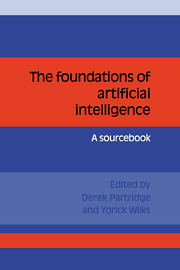Book contents
- Frontmatter
- Contents
- List of contributors
- Preface
- Acknowledgments
- 1 Introduction
- 2 The formal foundations of AI
- 3 Levels of theory
- 4 Programs and theories
- 5 The role of representations
- 6 The role of programs in AI
- 7 Rational reconstruction as an AI methodology
- 8 Is AI special in regard to its methodology?
- 9 Does connectionism provide a new paradigm for AI?
- 10 The role of correctness in AI
- 11 Limitations on current AI technology
- 12 Annotated bibliography on the foundations of AI
- Index of names
11 - Limitations on current AI technology
Published online by Cambridge University Press: 03 May 2010
- Frontmatter
- Contents
- List of contributors
- Preface
- Acknowledgments
- 1 Introduction
- 2 The formal foundations of AI
- 3 Levels of theory
- 4 Programs and theories
- 5 The role of representations
- 6 The role of programs in AI
- 7 Rational reconstruction as an AI methodology
- 8 Is AI special in regard to its methodology?
- 9 Does connectionism provide a new paradigm for AI?
- 10 The role of correctness in AI
- 11 Limitations on current AI technology
- 12 Annotated bibliography on the foundations of AI
- Index of names
Summary
Commercial AI is now big business, but AI itself is full of fundamental, unsolved problems; so what exactly is being marketed? Whether we wish to call it AI or expert systems, what are the scope and limitations of this technology?
Hewitt argues that there are severe limitations inherent in the ‘logic programming’ movement, because of its close association with current expert systems technology. He sees a need to deal with “open” systems that involve inconsistent knowledge and will need “due process reasoning” for decision-making.
On a broader front, Hewitt is questioning the suitability of the symbolicsearch- space paradigm (the foundational hypothesis of AI for the last thirty years) as a basis for intelligent systems. This paradigm, with its prerequisites of well-defined initial states, goal states, and state-transformation operators, is applicable to “artificial domains like chess and mathematical theorem proving. It is not very adaptable to the hurly-burly of solving problems involving interaction with the physical world.”
The Dreyfus brothers also argue that current expert systems' technology (CEST) is severely limited and it is built upon a fundamentally misguided view of human expertise. They see future progress in AI only when some fundamental assumptions are abandoned (such as knowledge as a collection of context-free units – another manifestation of the general pervasiveness of the symbolic-search-space paradigm) and radically new approaches to the problem are taken, such as attempting to understand and implement, on appropriate architecture, holistic reasoning methods.
- Type
- Chapter
- Information
- The Foundations of Artificial IntelligenceA Sourcebook, pp. 381 - 382Publisher: Cambridge University PressPrint publication year: 1990



